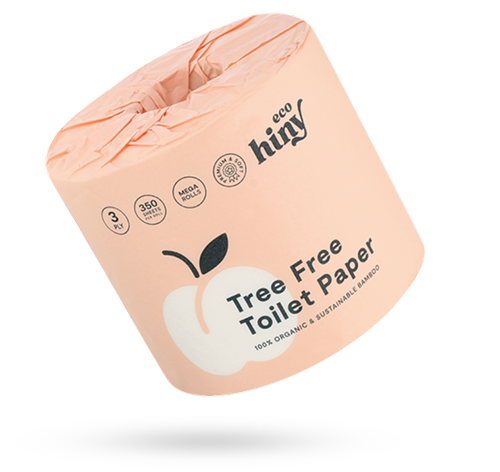Key Points
- Sustainable materials must support the environment, economy, and social equity — not just be recyclable or renewable.
- Recycled plastic isn’t always sustainable due to high processing costs and limited recycling infrastructure.
- Bamboo is one of the most sustainable materials available — fast-growing, chemical-free, and ideal for eco-friendly products like toilet paper.
Sustainable materials are materials that are produced, used, and disposed of in a way that minimizes their impact on the environment and promotes social responsibility. They are often renewable, recyclable, biodegradable, or have a low carbon footprint.
These materials are sourced and used in a manner that preserves ecosystems and promotes the well-being and longevity of our planet.
The UN Commission on Environment and Development has perhaps one of the most commonly cited definitions of sustainability. Their view is that sustainability is the ability to develop for the needs of the present without compromising the ability of future generations to meet their own needs. (1)
When companies focus on sustainability, they're working to improve an aspect of our environment, such as reducing chemical use, protecting forests, or improving animal welfare.
Companies and manufacturers that work to instill a fully sustainable model also address social and economic concerns. Job creation, fair pay, and optimal working conditions all fall into those categories.
Because ecoHiny is a company that cares about sustainability, we want you to be well informed on the true sustainability of the products you're purchasing.
Let us clue you in on the details of sustainable materials and clear up any misconceptions. It's our goal to help you become an eco-conscious consumer!

Hypoallergenic,BPA-Free, PFAS-Free, Elemental Chlorine-Free
ecoHiny's 3-ply bamboo toilet paper.
From $15.99
Defining True Sustainability
A comprehensive evaluation of a sustainable material involves assessing its environmental, social, and economic impacts. These are the major areas where a truly sustainable material will make a difference.
Environmental Impacts
Sustainable products can have several positive environmental impacts. They can help reduce carbon emissions, minimize waste, conserve natural resources, and promote biodiversity. It helps to examine the entire life cycle of a material from harvest to end-use.
Life Cycle Perspective
The life cycle of a sustainable material typically involves several key stages, including sourcing of raw materials, manufacturing, transportation, use, and end-of-life disposal or recycling. Sustainable materials are designed to minimize environmental impacts throughout their life cycle.
These include the effects of:
- Raw material extraction
- The manufacturing process
- Transportation
- Product use
- Disposal or recycling
Energy and water usage throughout the material's life cycle are also significant, and the material's impact on human health and the atmosphere, such as emissions of toxic substances or greenhouse gases, is also taken into account.
Renewability
Renewability is a crucial aspect of sustainability because it ensures that the resources used to create the materials can be replenished or replaced naturally.
Renewable materials are typically derived from natural sources that can be regenerated within a relatively short time frame.
Social Implications and Sustainable Materials
When it comes to sustainability, there's more to consider than just the environment; consumers should also evaluate social impacts.
Here are five aspects that ecoHiny encourages you to consider when evaluating the sustainability of a product:
- Social equity and justice: Ensuring that sustainability efforts benefit all members of society, including marginalized and vulnerable populations.
- Community well-being: Supporting the health and prosperity of local communities through sustainable practices and development.
- Cultural preservation: Respecting and preserving diverse cultural traditions and heritage as part of sustainable initiatives.
- Access to resources: Ensuring that all individuals have equitable access to essential resources such as clean water, nutritious food, and healthcare.
- Quality of life: Striving to enhance the overall quality of life for present and future generations through sustainable policies and practices.
The Economics of Sustainable Material
Economic factors play a critical role in sustainability. They encompass aspects such as resource availability, cost of production, market demand for sustainable products, and the economic viability of sustainable practices.
Companies that harvest raw materials or manufacture products using them consider each of these aspects and choose best practices that:
- Bolster the economy of surrounding communities
- Create jobs
- Conserve natural resources
- Respond to consumer demand
- Maintain practical production costs
Common Misconceptions: Recycled Plastic
One of the most common misconceptions about sustainability is the idea that all recycled materials are considered sustainable materials. Let's consider a ubiquitous recycled material: plastic.
Recycled plastics can contribute to environmental efforts by reducing the demand for new, virgin plastic, diverting waste from landfills, and conserving natural resources. However, the sustainability of recycled plastics depends on various factors, including the energy and resources required for the collection, sorting, cleaning, and processing of recycled materials.
While using recycled plastics helps to mitigate the environmental impact of plastic production, it's important to address the challenges associated with plastic recycling.
According to the University of Colorado Environmental Center, such challenges include:
- Lack of consumer knowledge on what plastics can and cannot be recycled
- Chemical exposure and machine hazards for workers
- Inadequate resources in cities to provide recycling programs
- Low market demand for recycled materials
As you can see, the issues are at odds with the environmental and social aspects a truly sustainable product would address.
While recycling does play a role in mitigating certain waste management issues (2), it's important for consumers to understand that it doesn't fit sustainability expectations.
Sustainable Materials That Are Actually Sustainable
There are some materials that end up in products that consumers can rely on to be truly sustainable. Here are a few options that align with the social and environmental goals of sustainability.
Organic Cotton
Grown without the use of synthetic pesticides or fertilizers and known for its minimalistic use of water, organic cotton is emerging as a sustainable option for textiles and fabrics.
Organic cotton farming practices promote soil health and biodiversity, largely in part due to their use of crop rotation. (3)
Brands like Pact, Thought Clothing, and People Tree offer clothing made entirely from organic cotton, promoting sustainable fashion.
Sustainably Harvested Wood
Essential for products ranging from furniture to paper, sustainably harvested wood is sourced from forests managed to maintain their biodiversity.
IKEA, for instance, ensures that a majority of their wood comes from more sustainable sources like Forest Stewardship Council-certified forests, touted as the most trusted label for identifying responsible forestry (4)
Bamboo: A True Sustainable Hero
Bamboo is super sustainable because:
- It takes less water than hardwood trees to establish and thrive
- It regrows from its existing root system
- The soil remains intact when it's harvested
- It doesn't require pesticides or fertilizers
Perhaps the most impressive characteristic that makes bamboo highly renewable and sustainable is its rapid growth rate and self-generation capabilities. As a renewable resource, bamboo has a much lower impact on the environment compared to hardwood.
Unlike traditional hardwood trees, bamboo can be harvested in just a few years and does not require replanting. Because of its incredible growth rate, harvesting isn't a hindrance to our environment like the loss of our forested lands.
Losing vast sections of forests to the paper industry means years before those trees are replenished, and in many cases, the soil is disrupted and damaged to the point that replanting is difficult. Bamboo solves this problem.
Because of its rapid growth, bamboo forests regrow in record time. Most importantly, when we use bamboo to manufacture paper products, we're stopping the harmful effects of deforestation.
Bamboo is also known for its strength, durability, and its natural resistance to pests and moisture. With all these incredible qualities, it's no wonder bamboo is emerging as an eco-friendly alternative to all sorts of products!
From textiles to construction materials, it's not surprising to spot bamboo in an array of items hitting store shelves.
Bamboo products quickly gaining popularity include:
- Toothbrushes
- Straws
- Flooring
- Clothing
- Furniture
- Paper products
Bamboo is also the raw material at the heart of our favorite sustainable product!
Introducing ecoHiny
We're very proud to bring you a sustainable solution to a household necessity. ecoHiny is a company that uses bamboo innovatively to create eco-friendly toilet paper that checks all the boxes for sustainability!
When you purchase ecoHiny, you can guarantee you're getting:
- 100% organic bamboo
- Completely tree-free toilet paper
- Zero plastics in production or packaging
- Carbon neutral shipping
- Only responsibly sourced bamboo from FSC-certified forests
Another perk of purchasing ecoHiny is the convenience of our subscription service. ecoHiny offers customizable delivery that allows you to choose the number of rolls and frequency, so you can tailor your purchase to the exact needs of your home.
The best part of a subscription is knowing you'll always have the most sustainable option for toilet paper on hand!

Hypoallergenic,BPA-Free, PFAS-Free, Elemental Chlorine-Free
ecoHiny's 3-ply bamboo toilet paper.
From $15.99
Sustainability is Our Business
Responsibility for protecting the planet is something all individuals should consider. Using eco-friendly products made from sustainable materials is an excellent way to do your part.
Being well-informed about the reality of what makes a material sustainable is a good first step to buying products that make a positive impact.
At ecoHiny, sustainability literally is our business. And we've done the work to ensure your peace of mind with every purchase.
Learn more about ecoHiny's eco-friendly toilet paper by browsing our site. Discover our bamboo-based products and get valuable information on how ecoHiny makes the most of super-sustainable bamboo!
Source:
- "Report of the World Commission on Environment and Development: Our Common Future." UN.org, sustainabledevelopment.un.org/content/documents/5987our-common-future.pdf.
- "Challenges in recycling." University of Colorado Boulder, www.colorado.edu/ecenter/2022/02/04/challenges-recycling.
- "Crop Rotations." Roldale Institute, rodaleinstitute.org/why-organic/organic-farming-practices/crop-rotations/.
- "What's in a Label." FSC, fsc.org/en/what-the-fsc-labels-mean.

Hypoallergenic,BPA-Free, PFAS-Free, Elemental Chlorine-Free
ecoHiny's 3-ply bamboo toilet paper.
From $15.99

Hypoallergenic,BPA-Free, PFAS-Free, Elemental Chlorine-Free
ecoHiny's 3-ply bamboo toilet paper.
From $15.99





